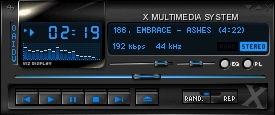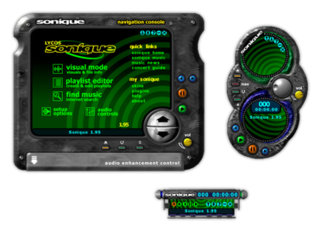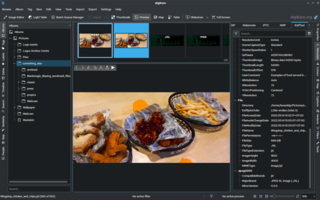Related Research Articles

X Multimedia System (XMMS) is an audio player for Unix-like systems released under a free software license.
A music tracker is a type of music sequencer software for creating music. The music is represented as discrete musical notes positioned in several channels at chronological positions on a vertical timeline. A music tracker's user interface is traditionally number based. Notes, parameter changes, effects and other commands are entered with the keyboard into a grid of fixed time slots as codes consisting of letters, numbers and hexadecimal digits. Separate patterns have independent timelines; a complete song consists of a master list of repeated patterns.
Scream Tracker is a tracker. It was created by Psi, one of the founders of the Finnish demogroup Future Crew. It was written in C and assembly language.

VLC media player is a free and open-source, portable, cross-platform media player software and streaming media server developed by the VideoLAN project. VLC is available for desktop operating systems and mobile platforms, such as Android, iOS and iPadOS. VLC is also available on digital distribution platforms such as Apple's App Store, Google Play, and Microsoft Store.

OpenMPT is an open-source audio module tracker for Windows. It was previously called ModPlug Tracker, and was first released by Olivier Lapicque in September 1997.
FastTracker 2 is a music tracker created by Fredrik "Mr. H" Huss and Magnus "Vogue" Högdahl, two members of the demogroup Triton which set about releasing their own tracker after breaking into the scene in 1992 and winning several demo competitions. The source code of FastTracker 2 is written in Pascal using Borland Pascal 7 and TASM. The program works natively under MS-DOS.
MOD is a computer file format used primarily to represent music, and was the first module file format. MOD files use the “.MOD” file extension, except on the Amiga which doesn't rely on filename extensions; instead, it reads a file's header to determine filetype. A MOD file contains a set of instruments in the form of samples, a number of patterns indicating how and when the samples are to be played, and a list of what patterns to play in what order.

The Gravis UltraSound or GUS is a sound card for the IBM PC compatible system platform, made by Canada-based Advanced Gravis Computer Technology Ltd. It was very popular in the demoscene during the 1990s.

Module file is a family of music file formats originating from the MOD file format on Amiga systems used in the late 1980s. Those who produce these files and listen to them form the worldwide MOD scene, a part of the demoscene subculture.

Sonique is an audio player for Microsoft Windows. Released as freeware, Sonique is capable of handling MP3, Ogg Vorbis, Windows Media Audio (WMA), and audio CDs. Sonique was in development until 2002. It was one of the most popular desktop audio players, second only to Winamp. The major features of Sonique include support for irregular skins, the audioEnlightenment MP3 decoding engine by Tony Million, innovative audio visualizations, and a 20 band graphic equalizer.
MO3 is a tracker module file format developed by Ian Luck for the BASSMOD engine. MO3 files contain samples encoded in the MP3 or Ogg Vorbis formats, rather than straight PCM samples. This results in reduced file size for the module, while maintaining almost identical audio quality. Lossless audio encoding is also supported, for samples that do not compress well with lossy encoding.

A tag editor is an app that can add, edit, or remove embedded metadata on multimedia file formats. Content creators, such as musicians, photographers, podcasters, and video producers, may need to properly label and manage their creations, adding such details as title, creator, date of creation, and copyright notice.
S3M is a module file format, the successor to the STM format used by the original Scream Tracker. Both formats are based on the original MOD format used on the Amiga computer.

The Mod Archive is a website dedicated to the indexing and archival of playable music module files. It allows anyone to upload modules, and provides charts, reviews and ratings of music files based on a community effort.
Impulse Tracker is a multi-track music tracker. Originally released in 1995 by Jeffrey Lim as freeware with commercial extensions, it was one of the last tracker programs for the DOS platform.

AIMP is a freeware audio player for Windows and Android, originally developed by Russian developer Artem Izmaylov. It supports a variety of audio codecs, and includes tools to convert audio files and edit their metadata. It also has the capability of installing user-made skins and plugins.
XMPlay is a freeware audio player for Windows. Initially released in 1998, it is often used as a reference player for tracker audio files.
MilkyTracker is a free software multi-platform music tracker for composing music in the MOD and XM module file formats.

uFMOD is a freeware audio player library written in x86 assembly language. It is used to load and play audio files in XM format.
References
- 1 2 Kameñar, Vladimir (2007). The Unofficial XM File Format Specification. Colombia: CelerSMS. ISBN 978-958-53602-0-4. OCLC 1262695345.
- ↑ Varga, Martin (2014). Learning AndEngine. Packt Publishing Ltd. ISBN 978-1-78398-596-8.
music composing (using the famous FastTracker 2)
- ↑ Sawyer, Ben; Dunne, Alex; Berg, Tor (1998). Game Developer's Marketplace. Coriolis Group Books. p. 295. ISBN 978-1576101773.
- ↑ Perekh, Ranjan (2006). "Audio File Formats and CODECs". Principles of Multimedia. McGraw Hill. p. 247. ISBN 0-07-058833-3.
- ↑ Alves de Abreu, Valter Miguel (2018-07-17). "Analysing trackers and their formats". Recreating tracker music sequencers in modern videogames: an integrated model approach for adaptive music (MSc). University of Porto. p. 17. S2CID 192364225 . Retrieved 2021-06-03.
- ↑ Sweet, Michael (2014). "MOD File Sequencing". Writing Interactive Music for Video Games. Addison-Wesley. p. 272. ISBN 978-0-321-96158-7.